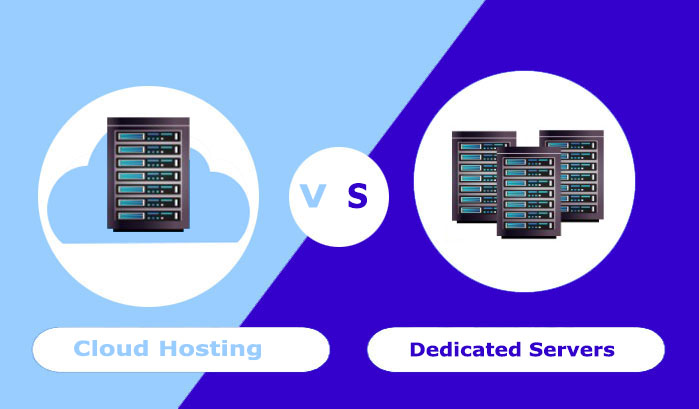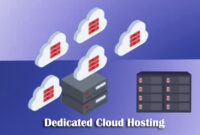Cloud Hosting vs. Dedicated Servers: Which is Right for Your Business?
In the dynamic landscape of web hosting, businesses are constantly seeking the best solutions to ensure their online presence is robust, scalable, and secure. Two popular options that often come into consideration are cloud hosting and dedicated servers. Both have unique advantages and potential drawbacks, making it essential to understand which one aligns best with your business needs. This article delves into the differences, benefits, and scenarios where each option might be the optimal choice.
Understanding Cloud Hosting
Cloud hosting leverages a network of virtual servers to host websites and applications. Rather than being confined to a single physical server, cloud hosting spreads the data across multiple servers, ensuring better resource allocation, scalability, and reliability.
Key Features of Cloud Hosting
- Scalability: Cloud hosting is highly scalable. You can easily adjust your resources (such as CPU, RAM, and storage) to handle increased traffic or demand. This makes it ideal for businesses with fluctuating traffic patterns.
- Reliability: Since your data is spread across multiple servers, cloud hosting offers excellent reliability. If one server fails, another can take over, minimizing downtime and ensuring continuous availability.
- Cost-Effectiveness: With cloud hosting, you pay for what you use. This pay-as-you-go model can be more cost-effective for businesses that do not need constant high resource allocation.
- Flexibility: Cloud hosting supports various platforms and applications, allowing businesses to deploy a wide range of solutions without compatibility issues.
Understanding Dedicated Servers
A dedicated server, on the other hand, is a physical server exclusively allocated to one user or organization. This means that all the server’s resources are available for your use, providing maximum performance and control.
Key Features of Dedicated Servers
- Performance: Dedicated servers offer superior performance since all the server’s resources are dedicated to your applications. This is particularly beneficial for high-traffic websites and resource-intensive applications.
- Control: With a dedicated server, you have full control over the server environment. You can customize the server’s hardware and software to meet your specific requirements.
- Security: Dedicated servers provide a higher level of security. Since you are not sharing the server with other users, there is less risk of security breaches from other hosted sites.
- Reliability: Dedicated servers offer consistent performance without the variability that can come with shared or cloud environments. This makes them highly reliable for mission-critical applications.
Comparing Cloud Hosting and Dedicated Servers
Scalability
- Cloud Hosting: Highly scalable, allowing for rapid resource adjustment to meet changing demands. Ideal for businesses experiencing growth or variable traffic.
- Dedicated Servers: Scalability is more limited compared to cloud hosting. While you can upgrade hardware, it involves more effort and cost.
Performance
- Cloud Hosting: Offers good performance, but can be affected by the shared nature of cloud resources. Performance may vary depending on the underlying infrastructure.
- Dedicated Servers: Superior performance due to exclusive access to server resources. Best suited for high-performance applications and heavy workloads.
Cost
- Cloud Hosting: Typically more cost-effective with a pay-as-you-go model. Suitable for businesses that need flexibility in resource usage.
- Dedicated Servers: Higher initial and ongoing costs due to dedicated hardware and maintenance. More suitable for businesses with consistent, high-resource needs.
Control
- Cloud Hosting: Less control over the underlying infrastructure. Suitable for businesses that prefer managed services without the need for deep customization.
- Dedicated Servers: Full control over hardware and software configurations. Ideal for businesses with specific technical requirements and in-house expertise.
Security
- Cloud Hosting: Generally secure, but potential risks exist due to the shared environment. Additional security measures may be needed.
- Dedicated Servers: Higher level of security due to exclusive use. Better for businesses with stringent security requirements.
Use Cases for Cloud Hosting
- Startups and Small Businesses: Cloud hosting provides a cost-effective and scalable solution for growing businesses. The ability to scale resources quickly makes it ideal for startups experiencing rapid growth.
- E-commerce Websites: Online stores with fluctuating traffic patterns can benefit from the scalability and reliability of cloud hosting. During peak shopping periods, additional resources can be allocated to handle increased traffic.
- Development and Testing Environments: Developers can quickly spin up and tear down environments in the cloud, making it ideal for development and testing.
- Content Delivery: Businesses focusing on content delivery, such as streaming services, can leverage cloud hosting to ensure fast and reliable content distribution across various regions.
Use Cases for Dedicated Servers
- Large Enterprises: Businesses with high-traffic websites and resource-intensive applications will benefit from the superior performance and control of dedicated servers.
- Financial Institutions: Banks and financial institutions with stringent security and compliance requirements often prefer dedicated servers for their critical applications.
- Gaming Servers: Online gaming platforms require high performance and low latency, making dedicated servers the preferred choice.
- Custom Applications: Businesses with unique technical requirements that need specific hardware configurations and software setups will find dedicated servers more suitable.
Choosing the Right Solution for Your Business
When deciding between cloud hosting and dedicated servers, consider the following factors:
- Business Size and Growth: For small to medium-sized businesses or startups expecting rapid growth, cloud hosting offers the flexibility and cost-effectiveness needed. Large enterprises with stable and high resource requirements may benefit more from dedicated servers.
- Budget: Cloud hosting’s pay-as-you-go model can be more budget-friendly for businesses with variable resource needs. Dedicated servers, while more expensive, offer better performance and control for businesses that can afford the investment.
- Technical Requirements: If your business needs specific hardware configurations, high security, and full control over the server environment, dedicated servers are the way to go. For less stringent requirements, cloud hosting offers sufficient flexibility and performance.
- Security and Compliance: Businesses with high security and compliance requirements should consider dedicated servers for better control and isolation. Cloud hosting can still be secure but may require additional measures to meet compliance standards.
Conclusion
Both cloud hosting and dedicated servers have their unique advantages and can cater to different business needs. Understanding the key features, benefits, and use cases for each can help you make an informed decision that aligns with your business goals and requirements. Whether you choose the scalability and flexibility of cloud hosting or the performance and control of dedicated servers, both solutions can provide a robust foundation for your online presence. Evaluate your specific needs, consider the factors outlined in this article, and select the hosting solution that will best support your business’s growth and success.




